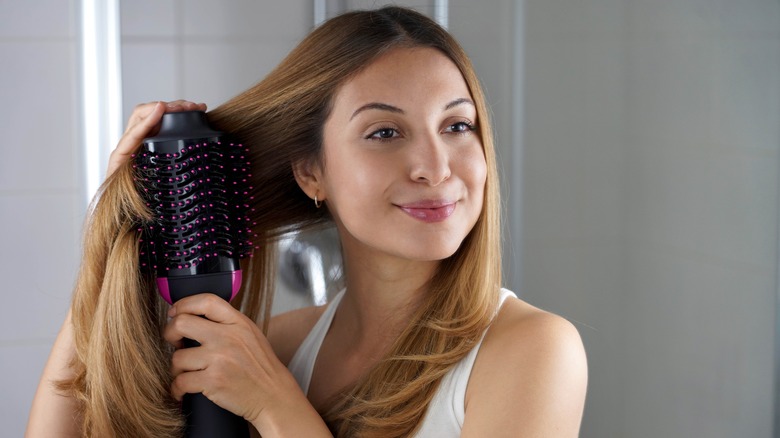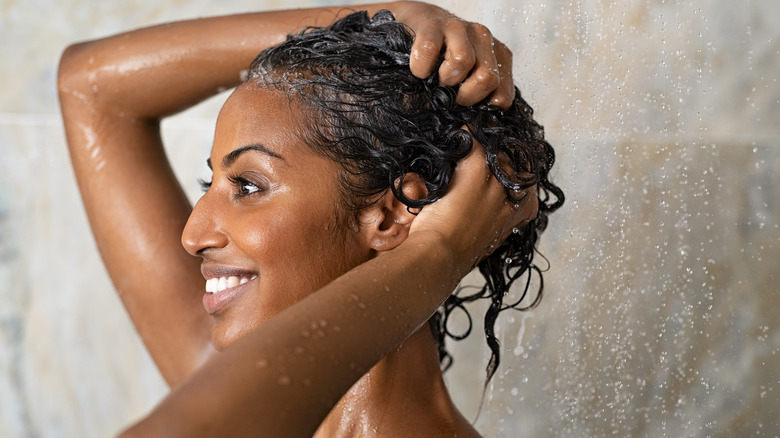Tips To Protect Your Hair From Summer Shedding
Everyone experiences hair shedding — it's normal to lose hair each day. However, you may just find that you're shedding a bit more of your mane in the warm summer months. This period can cause a lot of damage to our hair as we spend more time outdoors in the heat and expose our hair and scalp to the sunlight. Swimming can also dry out your strands, making them look more damaged and prone to shedding. Brushing your hair while it's wet can also have an impact on its health, and sitting in an air conditioned environment can strip it of its natural moisture.
In addition, you may see more natural shedding toward the end of summer. Natural hair fall increases in August and can last through October, dermatologist Dr. Francesca Fusco tells the Daily Mail. Meanwhile, hormones may also be the reason behind your hair fallout. "Fluctuations in hair growth and hair shedding may be associated with changes in hormones. Hormones such as testosterone, melatonin, thyroid hormones, estrogen, and prolactin might play a role in seasonal hair shedding," Dr. Jodi LoGerfo told Coveteur.
"Seasonal shedding may be difficult to avoid, as it seems to be cyclical," LoGerfo added. However, there are ways that you can protect your hair from excessive shedding and keep your locks looking great this summer.
Ditch the heat tools
It's no secret that many of us love our styling tools, and the thought of going without a hair dryer, curling iron, and straightener seems scary. However, there are many ways to protect your hair from heat damage during the summer. Taking earlier showers so that your hair can air dry is a great way to keep the excess heat away from your locks. In addition, braiding your wet hair to achieve waves or using a heatless curl tool can help you style without creating damage.
Of course, if you simply can't avoid using heat on your mane during the summer, there are some steps you should be taking. Using a heat protectant is crucial to help your strands stand up against hot styling tools. Keep the heat that you're using on your hair as low as possible, and never use a heat tool like a straightener on wet hair, as it will damage your locks. Try to avoid styling your hair with heat multiple times a week so that if you can't go without your heating tools, you still cut back on the amount of time you're using them. Your hair will thank you later.
Proper diet and hydration are key
Although you won't be able to avoid hair shedding altogether, keeping your body as healthy and hydrated as possible is a great way to keep your strands looking their best. Following a diet to promote hair growth may be just what you need. "Eat a balanced diet with plenty of vegetables, lean meat, and seafood—all of these contain the essential nutrients for hair," Dr. Dominic Burg tells Byrdie. To help your hair through nutrition, consider eating foods such as eggs and avocados to get the healthy fats you need.
Eating fresh produce can also be very beneficial to your body and hair. Leafy greens like spinach — as well as fruits and veggies such as peppers, tomatoes, and oranges — can benefit hair follicles and help combat excessive shedding. Foods containing omega-3 fatty acids like flax and chia seeds are also great to strengthen hair and promote growth.
Keeping your body hydrated is also very important, especially when you're looking to improve hair health. Dehydration can cause brittle hair that's prone to damage and breakage. Drinking plenty of water and eating hydrating fruits like watermelon will allow you to stay hydrated as you look and feel your best during the warm summer months.
Deep conditioning products can help prevent shedding
In addition to keeping your body hydrated, you may have to take steps to give your hair a bit more hydration as well. This is where a deep conditioning product, leave-in conditioner, or hair mask can be your best friend. Applying a hair mask before bed at night can give your hair a much-needed drink and allow your strands to soak in all the hydration and nutrients that will help make them stronger and healthier to prevent summer shedding. "This allows maximum penetration of moisture, lipids, and proteins to penetrate the hair cuticle to serve as the best foundation for the hair to retain elasticity and strength," trichologist Bridgette Hill told Byrdie.
Masks can include a number of ingredients — such as apple cider vinegar, eggs, honey, olive oil, and more — to help strengthen and nurture your mane. The right conditioner can also help your hair hold in extra moisture following washing, giving your strands more bounce and helping to prevent damage throughout the day. "Using a conditioner smooths the hair's cuticles, adds body, and essential ingredients. It also makes the hair easier to comb when wet which avoids further breakage," Lucy Chen, M.D., revealed to Well+Good.
Picking up a product at the store or creating a mask at home is easy. Some simple research can tell you what you want to know about all the different hair products and their uses.
Wearing protective hairstyles can help
By now, you should know that wearing your hair in tight hairstyles can be very damaging to your strands. In the summer, it's hard not to twist your hair into a bun or pin it up on top of your head to stay cool. However, wearing your locks free is actually the most beneficial for the health of your hair.
Tight hairstyles can create too much tension on the scalp and cause damage, which can lead to hair loss. "Traction, from certain hairstyles such as braids or very tight ponytails or cornrow type of braids, are very harmful because they can even cause a form of hair loss in the form of traction alopecia," Dr. Teo Wan Lin tells Science of Beauty.
Of course, sometimes you have to pull your hair back, and when you do, try using a protective style such as a loose ponytail or loose braids to combat tension on the scalp. Using silk scrunchies and claw clips can also help you secure your locks loosely while keeping them away from your face, neck, and shoulders during the steamy summer months.
Focus on your sleep
You may be focused on the health of your hair during waking hours, but how you sleep can actually have a big impact on your strands. It's important to protect your hair while you sleep by using things like a silk pillowcase or bonnet to prevent breakage. Going to bed with dry hair is also important to keep your locks at their best. "It's probably not the best idea to go to sleep with wet hair. If you trap water in your hair and then lie on it, you're creating a humid, steamy environment which proliferates nasties on your scalp," Dr. Alia Ahmed tells Refinery29.
Meanwhile, the amount of sleep you get is also important to prevent unwanted hair shedding. Proper sleep can help you regenerate cells and allow for stronger hair as well as growth, which is key during times when shedding is increased, such as the summer months. Seven to eight hours of sleep each night is recommended for a healthy body and healthy hair.





